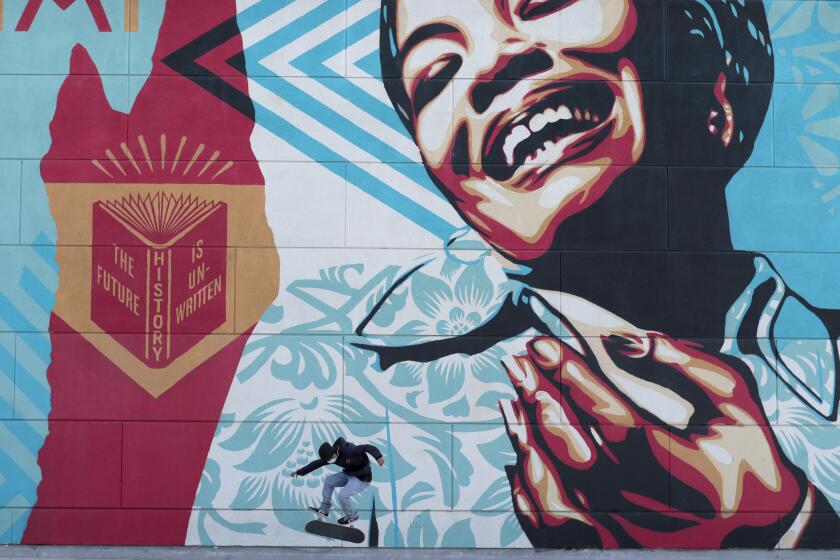A Jane Austen retelling that actually has something new to say

Book review
This Motherless Land
By Nikki May
Mariner Books: 352 pages, $30
If you buy books linked on our site, The Times may earn a commission from Bookshop.org, whose fees support independent bookstores.
Loosely based on Jane Austen’s most explicitly political and critically controversial novel, “Mansfield Park,” Nikki May’s “This Motherless Land” explores clashes of custom and class in a contentious Nigerian and English family.
Organized around four pivotal moments in the lives of two cousins — one Nigerian-born and biracial, the other English-born and white — this drama from May, who also wrote “Wahala,” exposes how family ties both bind and divide. In 1978, 10-year old Funke Oyenuga lives a comfortable life in suburban Lagos with her ethereal, artistic English mother, her proud, intellectual father, and her annoying younger brother, Femi. Their superstitious and disapproving relatives, Femi’s knack for dominating family attention, and Funke’s status as a girl in a place where boys are favored are her greatest annoyances. Then suddenly, an oil tanker shatters her world with the force of a tornado. In a blink, her mother and brother are dead, her father is a useless mess and Funke is sent to England to live with her mother’s family, whom she’d never known.
Like Fanny Price, at the age of 10, Funke Oyenuga becomes a displaced child at the mercy of better-off relatives, who think of themselves simply as her superiors. Unlike Austen’s Fanny, Funke is brown, and that brings its own complications among the aristocratic and lily-white Stones of Somerset, who carry misplaced pride in long-past glory. As Funke realizes, “She’d been fed a pack of lies. England wasn’t a fairy-tale land of plenty and these people weren’t rich. The house was run-down and worn out — holes in the rugs, squeaky floors, ramshackle furniture.”

It’s a rude and, in May’s deft hands, incredibly specific, well-observed cultural awakening. In the novel’s first section, which takes place when Funke is young, everything she thought she knew about England turns out to be wrong and she’s treated like a second-class citizen in her own family. Amid disappointing circumstances, the best part of this new life is the enthusiastic embrace of her cousin Olivia, or Liv. The girls’ bond is instinctual and, at least for Liv, unbridled. Crude cousin Dominic, Liv’s brother, is another story — he calls Funke “Zebra.” And their mother, Aunt Margot, is racist and resentful of Funke’s talents, which recall Funke’s dead mother.
Racism lives on a spectrum in this strange new land, and it’s treated mostly as a pervasive yet personal failing. Even Liv looks at Funke — whom the Stones eventually call by her more British and socially acceptable middle name, Kate — like she’s an exotic creature: “Kate was the first Black person Liv had got up close and personal with.” To Liv’s mind, “The biggest shock was how ordinary she was. Secretly, Liv had hoped her cousin would be half savage. She’d conjured up a wild, ferocious creature, jet black with beads in her hair, hefty and strong, a beautiful but frightening lioness.”
Still, in due course, despite relegating her to the attic of the Stones’ crumbling estate like the help, everyone but Dominic and Margot warms to the talented, hardworking Funke. Later, as Funke acclimates, it’s increasingly clear that Liv and all of the Stones have their own crosses to bear, not the least of which is the constantly critical and undermining Margot. Although their luster has long since faded, the Stone family name is still illustrious (the grandfather, Lord Stone, was once Home Secretary). And that, the socially ambitious Margot will never let go.
The genre-hopping author’s latest work is a literary thriller about love gone sour in Lagos, Nigeria.
A fascinating, malevolent force whose unquenchable desires poison everything around her, Margot takes sibling rivalry and status anxiety to the brink of madness. Margot is obsessed with her dwindling privilege and the valor she thinks her sister Lizzie, Funke’s mother, stole years ago. Long before the catastrophic accident brought Liv and Funke together, Lizzie had been the star of the family, the one with a thirst for life and the spirit to defy convention, marrying a handsome Nigerian medical student. Margot always resented her vibrant sister, but the rivalry curdled into long-term hate when Lizzie married outside societal norms, thereby diminishing Margot’s chances in their circles. And Margot never, ever rose above it.
As time moves on to 1986, 1992 and 1998, decades-old sins and resentments prove ever more toxic. Margot’s take the most obvious toll on Liv, who craves love and acceptance she can never get from her mother: “Liv had let her mother down by being too fat then too thin; too wild then too boring; too loud then too quiet. Each week her mother picked a specific failing.” The family struggles bleed beyond the borders of sister to sister and mother to daughter and become intergenerational. The relationship between Funke and Liv grows similarly complicated and, ultimately, dangerous. The consequences of Liv and Dominic’s mounting recklessness get blamed on Funke, and all the while Margot is plotting to grab what’s left of the Stone fortune.
It’s in this dissection of the consequences of family privilege and toxic personal grievance that the novel gains traction. Nikki May’s second novel excels at portraying the intricate cuts and scarring caused by family conflict and status obsession on an interpersonal level. Race complicates things, but not in a particularly political way. “This Motherless Land” centers the inheritance plot of “Mansfield Park,” but the struggles of pride and petty prejudices are another explicit motif. The jealousies they spawn are the real driver of this melodramatic but satisfying story.
Carole V. Bell is a culture writer and media researcher exploring politics and identity in art.
More to Read
A cure for the common opinion
Get thought-provoking perspectives with our weekly newsletter.
You may occasionally receive promotional content from the Los Angeles Times.











